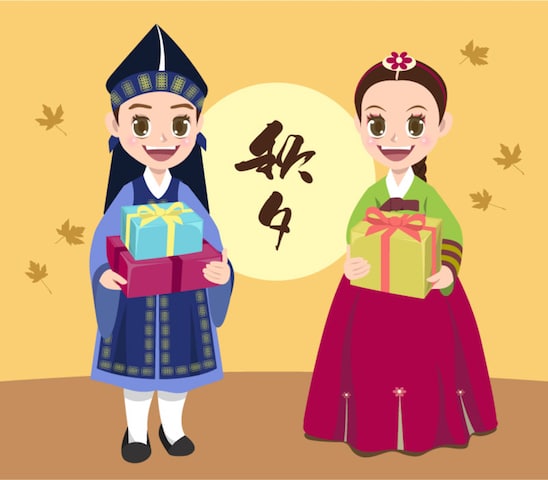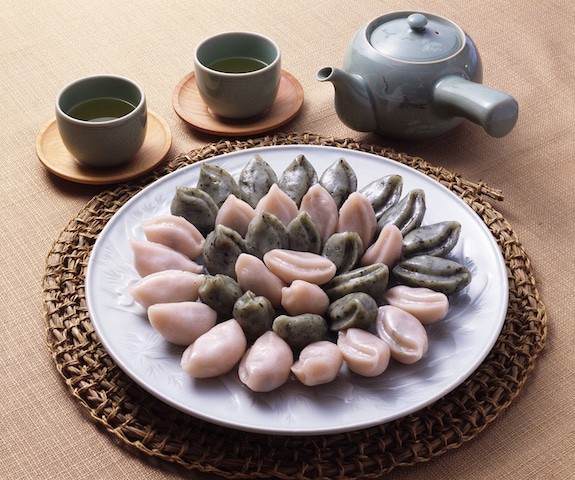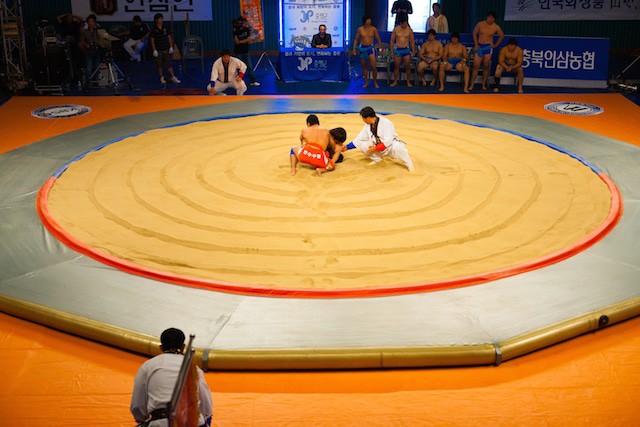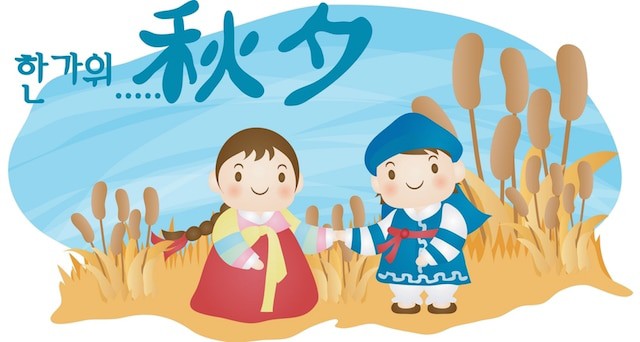Chuseok (추석) is the Korean version of Thanksgiving, celebrated every fall. It’s a three-day holiday, one among the biggest and most important holidays in Korea, and it’s celebrated on the 15th day of the 8th month according to the lunar calendar. In 2016, Chuseok in Korea will be celebrated from 14th September to 16th September.
Let’s go over some of the common questions that people have about Chuseok (Korean Thanksgiving).
What is the history of Chuseok?

Historically, the purpose of Chuseok – or Hangawi (한가위), as it’s sometimes referred to as – was for families to gather together during the full harvest moon, which appeared in the sky on the 15th day of the 8th month, to celebrate and show gratitude to their ancestors for the fruitful harvest.
What are some of the common customs for Chuseok?

Chuseok is the other time of the year, besides Lunar New Year’s Day aka Seollal (설날), that the whole family gathers together. Usually this means travelling to the home of the head of the family, often one’s grandparents, creating incredible traffic jams all over the country as people from big cities like Seoul try to make the journey to their hometowns. It’s still very much a traditional holiday where a lot of the customs from the old days still stand.
Let’s cover a few popular vocabulary words that you will be valuable for Chuseok in Korea.
Charye (차례)
This takes place on the morning of the day of Chuseok. It’s when the family gathers in their home to hold memorial services for honoring their ancestors. The representative foods for this service are recently harvested rice, songpyeon rice cakes, and alcohol. One of the main characteristics of the service is bowing to your ancestors. The service is followed by the family eating together.
Beolcho (벌초)
During Chuseok, it’s normal to go visit the ancestral graves and pluck the weeds that have grown around the grave since last time. It’s considered a familial duty and a sign of devotion, and often takes place already shortly before the Chuseok holiday itself.
A modern-time custom taking place during Chuseok is gift giving. In Korea, spam is one of the most popular gift sets to give at this period of time, although plenty of other gift ideas also exist and the supermarkets and department stores get filled with all sorts of gift sets applicable for gift giving.
What is popular to eat during Chuseok?
Songpyeong (송편)

The representative dish for Chuseok is songpyeon. It’s a type of a rice cake prepared with rice powder, filled with sesame seed, red beans, other beans, chestnuts and so on. This rice cake will then be steamed with pine needles to create a more distinctive taste. These rice cakes are prepared by the family the evening before Chuseok and are meant to look like the lunar moon. It’s a popular belief that those who succeed in making beautifully shaped songpyeons will give birth to a beautiful child or have a successful marriage.
Japchae (잡채)

Japchae is another popular dish to prepare and eat over Chuseok. This noodle dish is stir fried in sesame oil with vegetables such as mushrooms, onion, carrot, spinach, and others. Beef is also sometimes added to the dish, and soy sauce is usually used to add flavor.
Jeon (전)
The various types of Korean-style pancakes are also found at most Korean families’ dinner tables when it’s Chuseok. These are made by using fish, sweet potato, zucchini, and other various ingredients, that are coated with egg and/or flour, and then pan-fried.
Of course, it’s also popular to drink alcohol during Chuseok. This traditional liquor is made using the newly harvested rice.
What other things are commonly done during Chuseok?
There are also plenty of traditional games and performances that can be enjoyed during the holiday.
Ganggangsullae (강강술래)
This traditional dance is one performed by women as a prayer for a fruitful harvest. The women gather together under the full moon, make a circle, and grab each other’s hands while singing and rotating clockwise. The speed of the dance will steadily increase, and the dance might last even until dawn.
Ssireum (씨름)

Ssireum is a traditional wrestling sport in Korea. Two opponents wrestle each other while holding the opponent’s belt which is called satba (샅바). The winner is the player who manages to get their opponent down on the sandy ground. It’s commonplace for families to watch the ssireum contest on TV on the Chuseok holiday. The prices for winning the contest is a bull and rice.
This sport originally gained popularity during the times of the Joseon Dynasty, and traditionally this activity took place on Dano (단오), which is the holiday on the 5th day of the 5th month according to the lunar calendar.
Bull Fighting (소싸움)
This activity of unknown origin is also popular on Chuseok. Unlike Western-style bull fighting, the Korean bullfighting is much less gruesome. It’s not exactly just a competition as its purpose is also for showing how well the trainer raised their bull. These bulls will butt heads until one of them yields. Cheongdo (청도) is the city to visit if you want to see this.
How can foreigners enjoy Chuseok?

If you’ve been in Seoul during Chuseok before, you’ve probably noticed how empty it suddenly gets for a few days. As a foreigner, it’s often hard to experience Chuseok the traditional way unless your friend or significant other invites you to join their family, but if you want to get a small taste of it there are plenty of cultural sites in Seoul, such as Namsangol Hanok Village, that offer special holiday events.
Also, Chuseok in Korea might be the perfect opportunity to visit places like Everland or Caribbean Bay, which offer special discounts for foreigners during the holiday. The weather’s still pleasant enough to enjoy such outdoor activities and it’s much less crowded in comparison to a normal day.
What will you do during Chuseok this year? Let us know in the comments below!
 Learn to read Korean and be having simple conversations, taking taxis and ordering in Korean within a week with our FREE Hangeul Hacks series: http://www.90DayKorean.com/learn
Learn to read Korean and be having simple conversations, taking taxis and ordering in Korean within a week with our FREE Hangeul Hacks series: http://www.90DayKorean.com/learn
Korean lessons * Korean Phrases * Korean Vocabulary * Learn Korean * Learn Korean alphabet * Learn Korean fast * Motivation * Study Korean


Recent comments